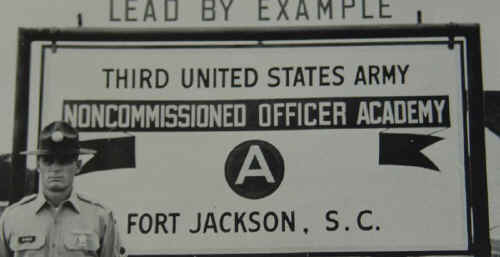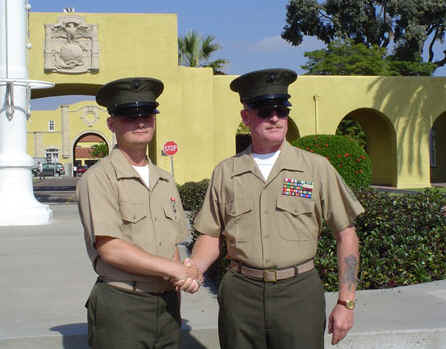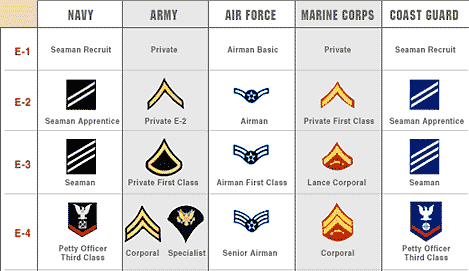The U.S. military has not adjusted to an all-volunteer military. Prior to World War II, enlisted men served a decade before they became an NCO (or PO "Petty Officer" in the Navy and Coast Guard). The rapid expansion of the U.S. military during World War II and high turnover due to later peacetime conscription sped up promotions and becoming an NCO in two years was not uncommon. Everyone who avoided serious trouble was rapidly promoted to the NCO ranks to encourage reenlistments. This problem persists today, so young NCOs often act, and are treated like "troops."
 Much higher pay
has greatly improved recruit quality and retention. The U.S. Army refuses to
enlist 75% of Americans who apply and says
one out of five Nevada high school graduates who inquire are not smart enough to join. The
U.S. military has not used this advantage to develop more experienced and
properly trained NCOs. GIs do not attend an NCO school prior to becoming one, and
since most troops leave after their
four-year enlistment it's a waste of resources to send all E-3s to an NCO school.
Much higher pay
has greatly improved recruit quality and retention. The U.S. Army refuses to
enlist 75% of Americans who apply and says
one out of five Nevada high school graduates who inquire are not smart enough to join. The
U.S. military has not used this advantage to develop more experienced and
properly trained NCOs. GIs do not attend an NCO school prior to becoming one, and
since most troops leave after their
four-year enlistment it's a waste of resources to send all E-3s to an NCO school.
While some newly commissioned officers face criticism as "90-day wonders" for just competing Officer Candidate School (OCS), becoming an NCO is mostly automatic with no requirement to complete any NCO training. An important step toward a truly professional NCO corps is to stretch out promotions for junior enlisted so that four years of service is required, along with completion of a serious NCO school.
The first problem is that junior enlisted are promoted too fast. Two promotions during the first year in service is mindless! Normal promotion to E-2 should be after one satisfactory year in service, which is double what is required today. Normal promotion to E-3 should be after two satisfactory years in service. Each military service controls their enlisted promotion process, but these timelines are common.
Typical Promotion to:
E-2 - now 6 months in service, but should be 12 months.
E-3 - now 10-12 months in service, but should be 24 months.
E-4 - now 24-36 months in service, but should occur as GIs graduate from NCO school after 48 months.
Stretching out promotions to a reasonable pace would allow the selection process for E-4 to merge with the reenlistment process. Promotion to E-4, the first NCO grade, should occur after four years in service. E-3s accepted for reenlistment must also complete a formal NCO school. This would not be a quick 2-4 week local program, but a serious 10-week national program similar to OCS. If accepted for reenlistment an E-3 would get TAD/TDY orders to an NCO school at the end of their first enlistment, often en route to their next duty station.
This would not be a fun school
where 100% graduate. They would live in open barracks and return to a basic
training environment with drill, physical fitness, hiking, and weapons training,
during a six-day
a week/14-hour a day training schedule. Around 95% would graduate since they were recommended by their
command.
Some will not because they arrived obese or unable to pass a basic physical
fitness test, despite assurances from their slack sponsoring command. Others
developed an ego or became lazy during their enlistment and feel too important to engage
in tough training. Some highly trained GIs have six-year initial enlistments. Most
would be
sent to NCO school at their four year mark, and the few who fail would finish
their last two years as an E-3. Upon graduation, all would be promoted to E-4 and welcomed into the NCO
ranks during a formal ceremony.
Promotion to E-4 in the reserves and National Guard would require completion of the same 10-week active-duty NCO school. Capable E-3s with four years of service in the reserves would be offered a chance to attend NCO school for promotion to E-4. If they are too busy in civilian life to attend, they are too busy to become an NCO. They would attend alongside regular soldiers, which would greatly enhance professionalism and cooperation in the Total Force. In addition, many outstanding E-3s in the regular force are not interested in reenlisting, but would express interest in NCO school and promotion to E-4 if they enlist in a local reserve or National Guard unit. NCO school would prove an attractive recruiting tool for the reserves as a highly paid "summer job" for veterans attending college.
NCO Chevrons
The armed services must clean up their chevron mess. An E-1 with no chevrons looks just like a young officer from the side. (pictured) Recruits should get a stripe at graduation from basic training. This would be a simple hash mark for the Navy and Coast Guard, whose titles and insignia clearly separate young NCOs (POs) from seamen.
 The Army,
Air Force, and Marine Corps need to simplify their chevron mess since they often operate jointly. It's so bad that few Generals can identify the
grade of enlisted from all the armed services. This problem is never addressed when the need for "jointness"
or greater NCO respect is emphasized. Most GIs cannot look at the
chevrons of other services (below) and distinguish troops from NCOs. A Marine Corps Private
First Class is an E-2, but is an E-3 in the Army. Some titles are confusing,
like the odd Marine Corps E-3 title of Lance Corporal. The Army's
strange E-4 "Specialist" title is an outdated rapid promotion idea
from decades ago when pay was low and recruiting difficult.
The Army,
Air Force, and Marine Corps need to simplify their chevron mess since they often operate jointly. It's so bad that few Generals can identify the
grade of enlisted from all the armed services. This problem is never addressed when the need for "jointness"
or greater NCO respect is emphasized. Most GIs cannot look at the
chevrons of other services (below) and distinguish troops from NCOs. A Marine Corps Private
First Class is an E-2, but is an E-3 in the Army. Some titles are confusing,
like the odd Marine Corps E-3 title of Lance Corporal. The Army's
strange E-4 "Specialist" title is an outdated rapid promotion idea
from decades ago when pay was low and recruiting difficult.
 Civilian leaders
must demand standardization. In the Army, Air Force, and Marines an E-1 should be a Private Third Class with one stripe; an
E-2 Private Second Class with two stripes; and an E-3 Private First Class with three
stripes. All would be addressed as "Private." These may be straight hash marks like
the Navy or V stripes used by the British, the U.S. Army prior to
1902, and the U.S. Air Force today. As a result, Private Jones would be called
"Private Jones" as an
E-1, E-2, and E-3, in the Army, Marines, or Air Force, so the jump to an E-4
Corporal would be dramatic. Titles for
E-4s should be altered to clarify their leadership status, like our Navy and
Coast Guard. For
example, an E-4 Air Force Corporal is better than "Senior Airman"
and the Air Force should invert their chevrons for E-4s and above to match the Army
and Marine Corps.
Civilian leaders
must demand standardization. In the Army, Air Force, and Marines an E-1 should be a Private Third Class with one stripe; an
E-2 Private Second Class with two stripes; and an E-3 Private First Class with three
stripes. All would be addressed as "Private." These may be straight hash marks like
the Navy or V stripes used by the British, the U.S. Army prior to
1902, and the U.S. Air Force today. As a result, Private Jones would be called
"Private Jones" as an
E-1, E-2, and E-3, in the Army, Marines, or Air Force, so the jump to an E-4
Corporal would be dramatic. Titles for
E-4s should be altered to clarify their leadership status, like our Navy and
Coast Guard. For
example, an E-4 Air Force Corporal is better than "Senior Airman"
and the Air Force should invert their chevrons for E-4s and above to match the Army
and Marine Corps.
Real NCO Training and Status
Sending all E-3s selected for reenlistment to a formal NCO school would not cost more money if promotion timing is slowed, since lower-ranking GIs are paid less. Moreover, our military would no longer waste money sending junior GIs to varied short leadership schools unless they've signed papers to reenlist in the active force or reserves. NCO school should become as necessary for promotion to E-4 as OCS is for a second lieutenant. These simple changes would quickly improve the quality and morale of the enlisted force. All "troops" (E-1/E-2/E-3) should be called private or seaman, and all NCOs should have clear leadership chevrons and titles. Everyone would respect a young corporal knowing that he has more than four years in service, chose to reenlist, and graduated from a serious NCO school.
Carlton Meyer editorG2mil@Gmail.com
©2014 www.G2mil.com